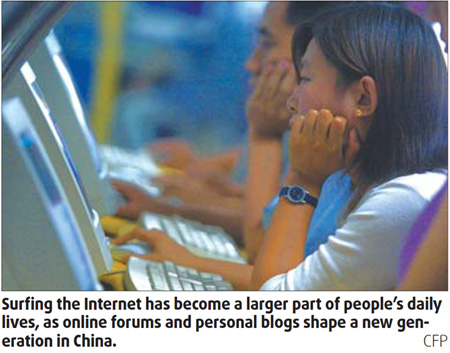
|
CHINA> National
 |
|
Internet encourages a new era of individual voices
(China Daily)
Updated: 2009-10-19 10:08 Internet blogger Shao Yibei describes herself as "a tiny drop of water in the ocean of Chinese netizens longing to shine". She never expected to attract an instant spotlight on her work.
 The 26-year-old music lover had a five-minute video clip uploaded to the Internet in February. In the video, she was playing guitar and singing a song she wrote about an urban single woman's attitude toward marriage.
Response from the virtual world was overwhelming, with Shao's online video clip receiving more than 300,000 visits, or hits, during the first few days. Shao also received thousands of requests to "become her friend" on her blog. Movie producers invited Shao to compose songs, and work on her first album is under way, she said. "I find it difficult to communicate with others in real life, so music is my way of expression," Shao said. "But it's the Internet that makes me heard." Shao is now known as a folk music singer and blogger Shao Xiaomao. "It's such a happy surprise to see my ideas being shared by so many people. I'm not alone," Shao said. With the praise has come some criticism about openly expressing ideas on the Internet. Shao's mother, a high school teacher, is among the critics. "My mom first felt shameful that I was talking about marriage in the song in a straightforward way, which she thought should be private," Shao said. "Then she blamed me for standing out on the Internet, even though she knew it wasn't me who started it," she said. But Shao disagrees with her mother. "If I'm able to express my ideas freely, why shouldn't others?" she asked. The different opinions from a mother and daughter reflect the profound changes in China since the country adopted reform and opening up policies in the late 1970s, said Hu Qiheng, chair of the Internet Society of China. Hu said the Internet is playing an important role in raising public awareness about individuality and citizenship in China, by "providing a platform for the Chinese, who tend to be silent in real life, to express themselves and exchange ideas". In April 1994, as the vice president of the Chinese Academy of Sciences, Hu applied to the US National Science Foundation to be connected with the Internet, and thus ushered in a new cyber world for the most populous country in the world. The first Internet surfers in China were more than 1,000 scientists. Fifteen years later, the country's netizen population surged to 338 million, according to a report released by the China Internet Network Information Center (CNNIC) in July. "Everyone is someone on the Internet, which has been shaping a new generation in China," Hu said. "Between their own interests and mainstream social values, they are more freely pursuing the former than their parents," Hu said. The Internet has broadened information sources for the general public, said Chen Jiangong, a CNNIC senior analyst. "More importantly, the distribution of information is interactive and real-time," Chen said. Zhang Jie, a 26-year-old magazine editor in Chongqing, has found surfing online indispensable in her daily life since she began accessing the Internet 10 years ago. Like most of her friends and colleagues, Zhang relies heavily on the Internet for work, entertainment and shopping. "The Internet does not only bring convenience to my life; more importantly, it reforms my mindset," Zhang said. Zhang said diverse voices and a wider array of information were not available before the arrival of the Internet. Tianya Forum, a virtual social community based in southern Hainan province, is Zhang's favorite. Her daily visit to the forum includes reading entries from Tianya By-talk, which focuses on social issues. The forum receives more than 100 million visits each month, according to Tianya By-talk administrators. "Different opinions stir skepticism and push me to look into the issues more carefully before coming to a conclusion," Zhang said. "It transforms me into a person with independent thought and an open mind," she said. Researchers said the Internet has proven valuable in increasing access to issues of public concern and the meaning of citizenship. "Expression of individuality needs to be encouraged in a country which values creativity. The Internet is speeding up the maturity of Chinese people's individuality," Hu said. Xinhua |